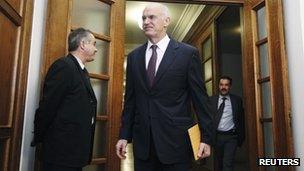Greek cabinet backs George Papandreou's referendum plan
- Published
- comments

The Greek prime minister says a referendum will send a clear message
Greece's cabinet has given unanimous backing to a controversial plan by PM George Papandreou to hold a referendum on a EU debt rescue package.
He told an emergency cabinet meeting a referendum, possibly in December, would offer "a clear mandate" for austerity measures demanded by eurozone partners.
Stock markets recorded big drops amid shocked reactions in eurozone capitals to the referendum announcement.
Mr Papandreou is due to meet European leaders in France on Wednesday.
In a cabinet meeting lasting late into Tuesday night, Mr Papandreou told ministers the government needed the consent of the Greek people.
In a statement released by his office, he said: "The referendum will be a clear mandate and a clear message in and outside Greece on our European course and participation in the euro."
Mr Papandreou also said a possible alternative of snap elections would risk Greece defaulting on its debt.
The Greek government faces a crucial confidence vote in parliament on Friday.
One MP from the governing Pasok party has resigned, cutting Mr Papandreou's parliamentary majority to two - and six other leading party members have called on him to resign.
Market turmoil
Following the seven-hour meeting, government spokesman Elias Mossialos said: "The cabinet expressed its support."
"The referendum will take place as soon as possible, right after the basics of the bailout deal are formulated," he added.
Speaking on state television on Monday, interior minister Haris Kastanidis said there was a possibility the referendum could be held "within December", Reuters reported.
Monday's referendum announcement led to sharp falls on world markets on Tuesday. Asian markets also continued their slide on Wednesday.
The planned referendum threatens to unravel a deal reached at a EU summit last week aimed at resolving the euro debt crisis.
Leaders agreed on a 100bn-euro loan (£86bn; $140bn) to Athens and a 50% debt write-off.
But in return, Greece must make deep cuts in public spending, slashing pensions and wages and making thousands of civil servants redundant.
There have been widespread protests in Greece against the measures.
Three-way talks
On Tuesday President Nicolas Sarkozy of France said Mr Papandreou's decision "surprised all of Europe".
The French and German governments said they wanted "full implementation" of the agreement "in the quickest time-frame".
Mr Papandreou is to hold hastily arranged talks on Wednesday with Mr Sarkozy and German Chancellor Angela Merkel, on the sidelines of a G20 summit in France.
In a joint statement, President Sarkozy and Chancellor Merkel said the decisions taken by last week's EU summit were "more necessary than ever".
"France and Germany are convinced that this agreement will allow Greece to return to sustainable growth," they said.
Last week's marathon EU summit was intended to rescue Greece and bring the 17-nation eurozone back from the brink of disaster.
Eurozone chief Jean-Claude Juncker said if a referendum rejected the bailout, it could mean bankruptcy for Greece.
"It will depend on the manner in which the question will be exactly formulated and on what the Greeks exactly vote on," he said.
Confidence vote
Some Greek government ministers had been unaware of the referendum plan until it was announced.
The announcement even took Greece's Finance Minister Evangelos Venizelos by surprise, Greek media reported.
One MP from the governing Pasok party has resigned, cutting Mr Papandreou's parliamentary majority to two ahead of Friday's confidence vote.
The Greek opposition has called for early elections, saying the referendum jeopardises Greece's EU membership.
Antonis Samaras, leader of the main opposition New Democrats, said: "In order to save himself, Mr Papandreou has posed a dilemma of blackmail that puts our future and our position in Europe in danger."